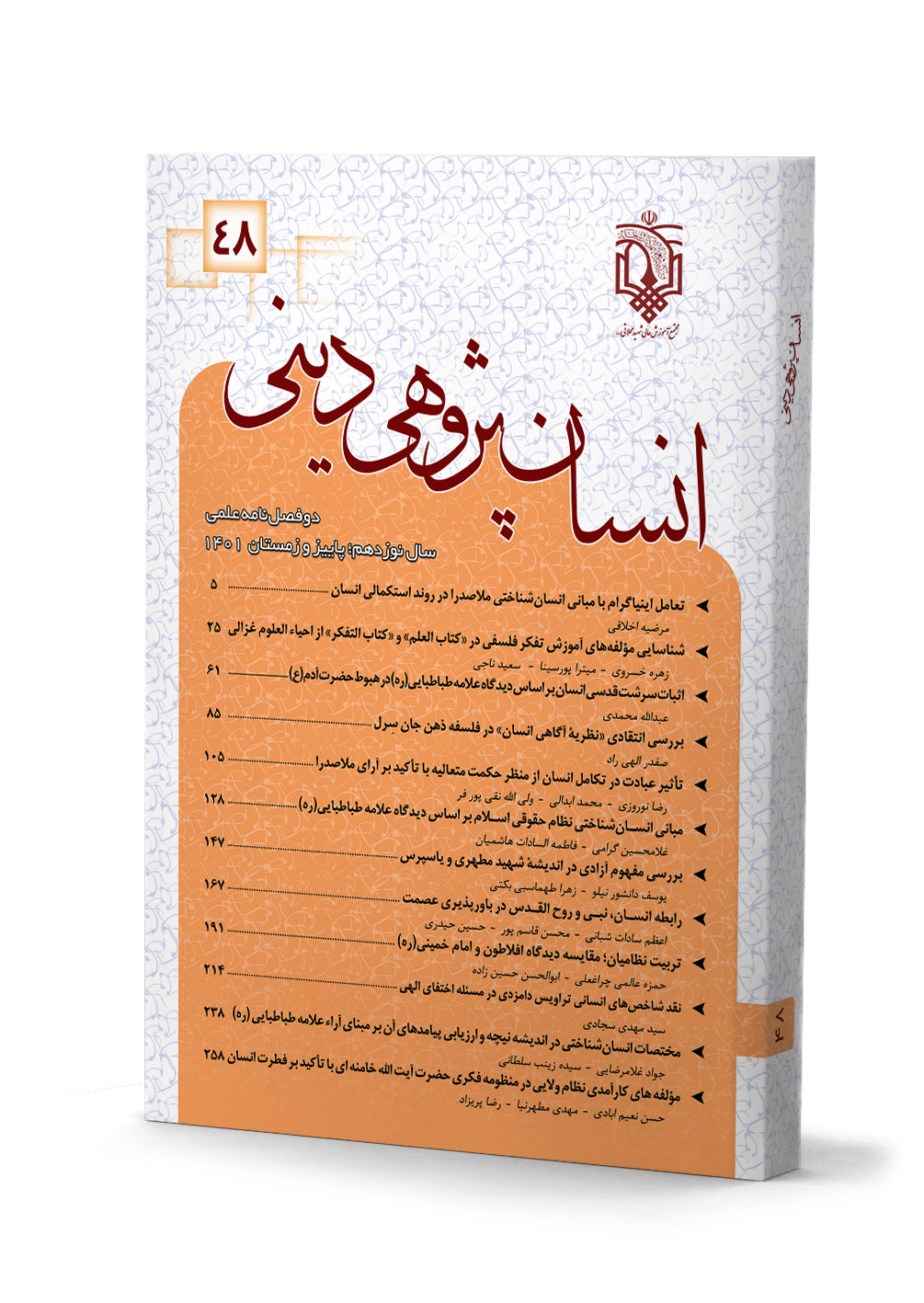The Anthropological Foundations of Legal System in Islam in the View of Allamah Tabatabaei
Document Type : Research Paper
Authors
1 Assistant Professor In Department of Theoretical Foundation of Islam, Qom, Iran
2 Assistant Professor In Department of Theoretical Foundation of Islam.
10.22034/ra.2023.552192.2765
Abstract
The legal system is one of the critical social structures the theories of which are affected by identity, rationality, and defined anthropological foundations. Allamah Tabatabaei is among the notable thinkers in contemporary Islam. A coherent analysis of his anthropological views can result in the development of a comprehensive Islamic legal system. The present research has collected data through library note-taking and analyzed them through the descriptive-Analytical method to explain and interpret the anthropological foundations of such a legal system. It was revealed that in Allamah’s anthropological foundations, the theory of natural employment and lordship-baseness of Man is underscored, and the necessity and divine legitimacy of the legal system are emphasized. In addition to that, the principle of bliss-seeking and multi-dimensionality of human righteousness is mentioned, and concluded that a comprehensive and justice-oriented legal system is necessary for human felicity and bliss. Also, it was proved that the principles of human independence and its necessity, human dignity, and its preservation, the nature-based orientation of humans, and the target orientation of the legal system are necessary principles in Allamah’s anthropological foundations. Principles of equality, freedom, life worth, the natural tendency to possession, and human limitations are other anthropological principles in Allamah’s views which submit evidence on the equality of rights, responsibility for the execution of laws, right of life, right of possession and facilitative nature of Islamic laws.
Keywords
- قرآن کریم.
- ابن بابویه، محمد بن علی (1403ق)، الخصال، قم: جامعه مدرسین.
- اراکی، محسن (1396)، فقه نظام سیاسی اسلام، قم: مجمع الفکر اسلامی.
- جمعی از نویسندگان (1381)، مرزبان وحی و خرد، قم: بوستان کتاب.
- خسروپناه، عبدالحسین (1382)، انتظارات بشر از دین، قم: دانش و اندیشه معاصر.
- ـــــــــــــــ (1396)، منظومه فکری آیتاللهالعظمی خامنهای (نظام بینشی، منشی و کنشی)، تهران: سازمان انتشارات پژوهشگاه فرهنگ و اندیشه اسلامی.
- خمینی، سید روحالله (1389)، صحیفه نور، تهران: انتشارات تبیان، چاپ پنجم.
- دال، رابرت (1364)، تجزیهوتحلیل جدید سیاست، ترجمه حسین مظفریان، بینا.
- دانشپژوه، مصطفی (1392)، مقدمه علم حقوق، تهران: سمت، چاپ دهم.
- شاپیرو، جان سالوین (1380)، لیبرالیسم؛ معنا و تاریخ آن، ترجمه محمد سعید حنایی کاشانی، تهران: انتشارات مرکز.
- طباطبایی، محمدحسین (1372)، المیزان فی تفسیر القرآن، تهران: دارالکتب الاسلامیه.
- ـــــــــــــــ (1378)، شیعه، قم: بوستان کتاب، چاپ دوم.
- ـــــــــــــــ (1384)، خلاصه ترجمه تفسیر المیزان، کمال مصطفی شاکر، تهران: اسلام، چاپ سوم.
- ـــــــــــــــ (1387)، بررسیهای اسلامی، تنظیم هادی خسروشاهی، قم: بوستان کتاب.
- ـــــــــــــــ (1386)، رساله الولایه، ترجمه صادق حسنزاده، قم: مطبوعات دینی.
- فاستر، مایکل برسفورد (1394)، خداوندان اندیشه سیاسی، ترجمه جواد شیخالاسلامی، تهران: امیرکبیر، چاپ نهم.
- فخر رازی، محمدبن عمر (1420ق)، تفسیر الکبیر، بیروت: دار احیاء التراث العربی.
- قنواتی، جلیل (1377)، نظام حقوقی اسلام، قم: دفتر تدوین کتب درسی مرکز جهانی علوم اسلامی.
- کاتوزیان، ناصر (1365)، فلسفه حقوق، قم: بهشهر، چاپ دوم.
- کلینی، محمد بن یعقوب (بیتا)، الکافی (دارالحدیث)، قم: مؤسسه علمی فرهنگی دارالحدیث، سازمان چاپ و نشر.
- مجلسی، محمدباقر (1430ق)، بحارالانوار، بیروت: دار الاحیاء التراث العربی.
- مصباح یزدی، محمدتقی (1380)، حقوق و سیاست در قرآن، قم: مؤسسه امام خمینی8، چاپ دوم.
- ـــــــــــــــ (1378)، نظریه سیاسی اسلام، قم: مؤسسه امام خمینی8.
- هیوود، اندرو (1379)، درآمدی بر ایدئولوژیهای سیاسی، ترجمه محمد رفیعی مهرآبادی، تهران: انتشارات وزارت خارجه.
